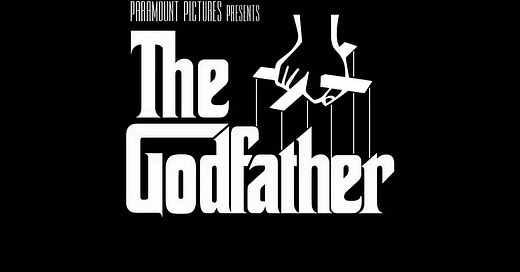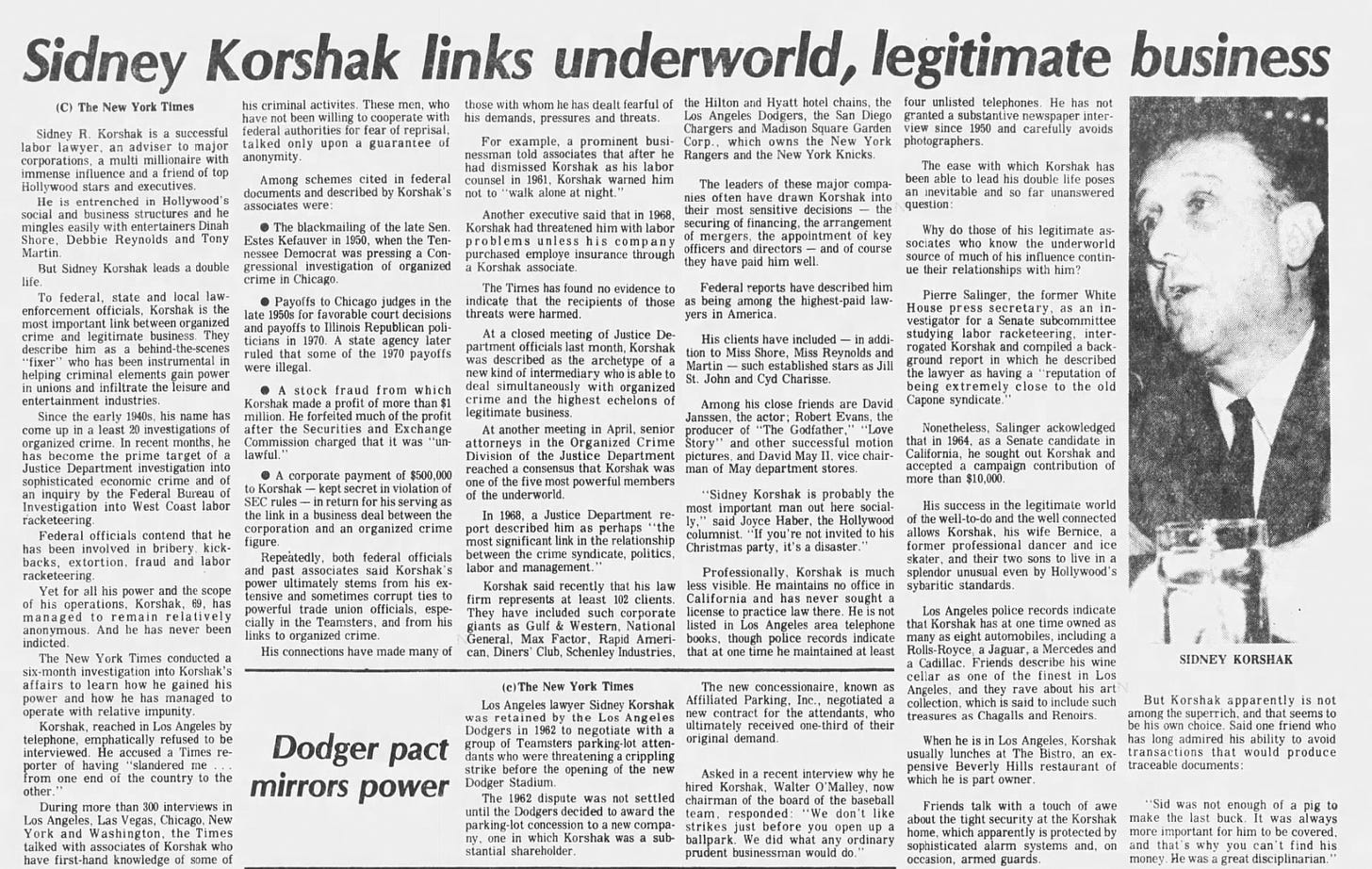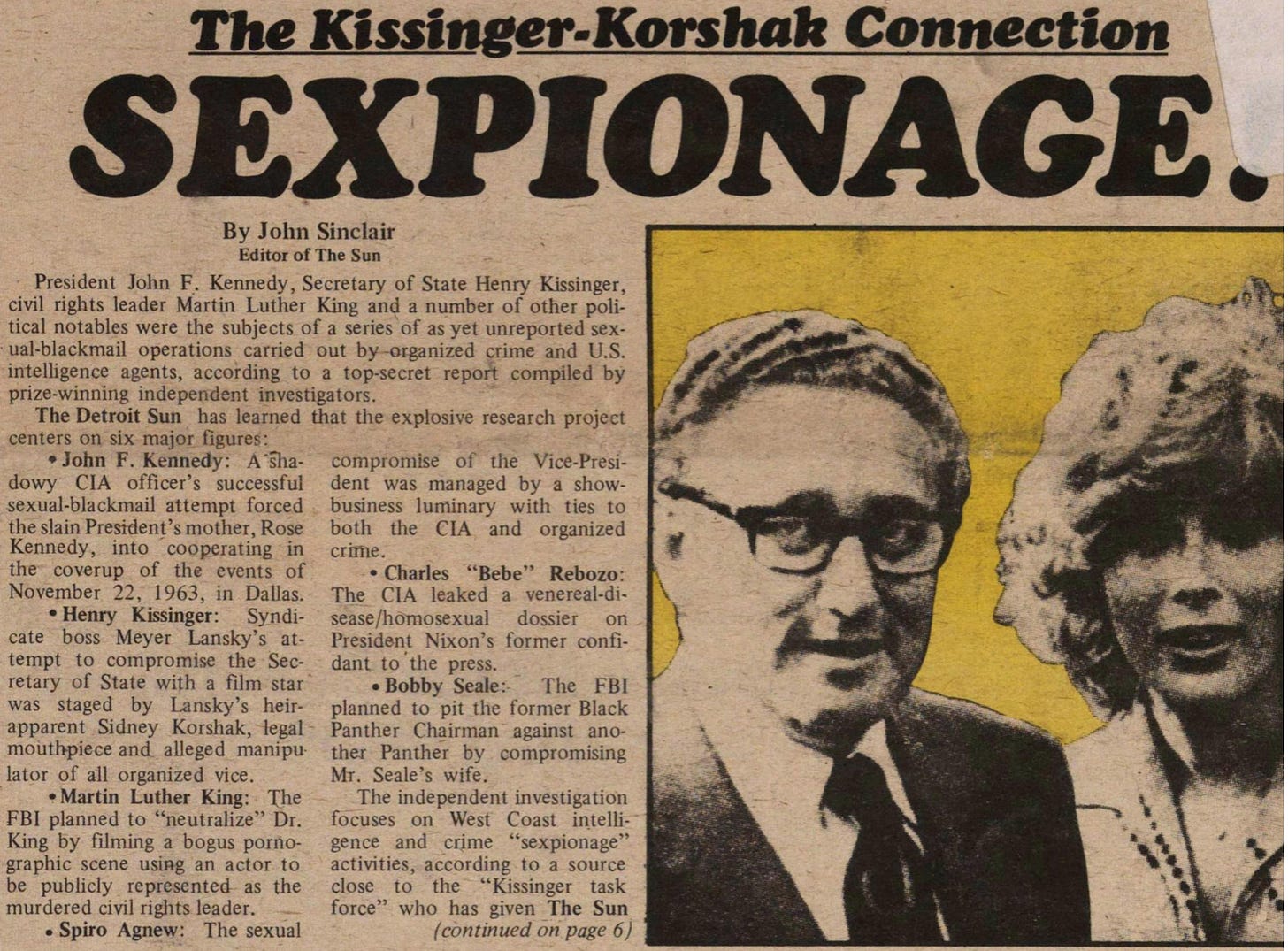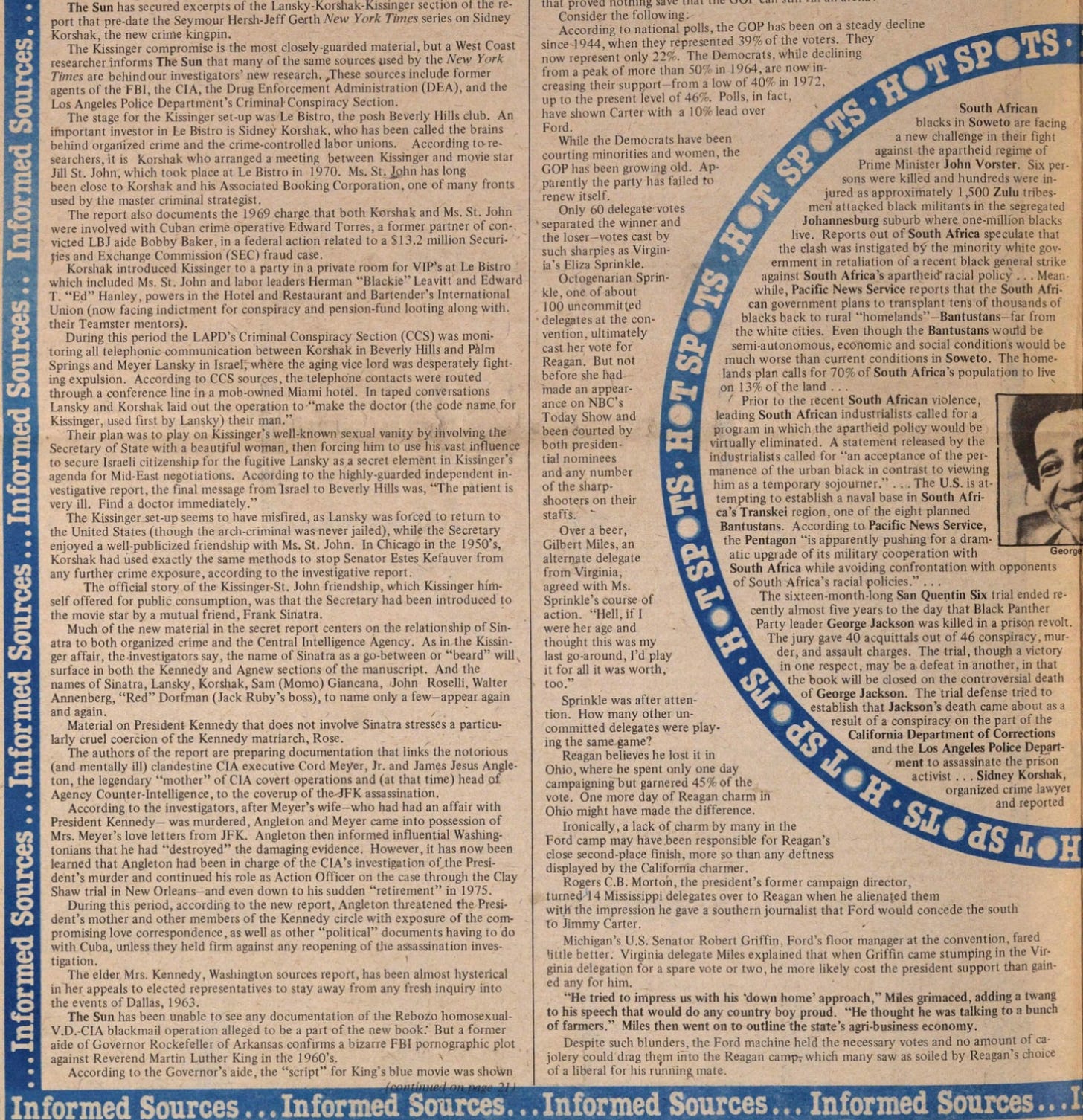Who Really Made The Godfather?
A meditation on Israeli spies, Jewish gangsters and the American Dream
As recently portrayed in the miniseries The Offer, in 1969 Paramount Pictures announced the production of perhaps the most important movie in American history - The Godfather. This miniseries itself however (which presents the film as the project of a young charismatic Albert Ruddy charming his way into the good graces of Robert Evans and Joe Colombo) distorts a great deal of The Godfather’s true history and legacy, both of which I will correctly present here.
That The Offer is little more than a glorified depiction of Albert Ruddy, Robert Evans and Paramount Pictures owner Charles Bludhorn as a group of forward-thinking visionary Jewish artists is no wonder - produced as it was for Paramount+ and based off Ruddy’s own memoirs.
But how did a lone “computer programmer” really get cliqued in (almost immediately) with both the production chief of Paramount Pictures and his mysterious first wife, the then-owner of Hollywood’s illustrious Chateau Marmont hotel? Could there have been anything else going on there?
To start, we might revisit the oft-mentioned fact that Albert Ruddy’s career began its meteoric ascent while he was working at the RAND corporation, a well-known intelligence recruiting ground. This upward turn accelerated in earnest after Ruddy’s aforementioned partnership with (and following marriage to) Israeli émigré/Chateau Marmont owner Francoise Glazer, who had previously been married to commercial real estate oligarch Guilford Glazer - the famous life long Israel supporter (a close friend of Likud-Israeli diplomat Avi Pazner and later Benjamin Netanyahu)
Why these background details were glossed over during the show’s exposition is anybody’s guess, but they become much more interesting when we examine Ruddy’s subsequent introduction to the film world through Paramount Pictures head of production (and later-convicted cocaine trafficker) Robert Evans.
Evans, the legendary Hollywood socialite, was himself brought into his role at Paramount through Greg Bautzer at the behest of Sidney Korshak, the notorious American-Jewish Chicago outfit mob-fixer deemed at one time by the FBI “the most powerful lawyer in the world”.
Sidney Korshak (whose central role in the film’s creation is suspiciously absent in The Offer) had spent his impressive career as a go-between for various shadowy power brokers of his era, including countless members of the American political and cultural elite, Teamsters, spies/mobsters, and perhaps most significantly the gangland kingpin/former covert Israeli Haganah asset Meyer Lansky. Indeed, Korshak - alongside his network of lawyers and politicians, was said to be the “heir-apparent” of Lansky’s vast organized crime empire.
Supporting this underworld connection, Charles Bludhorn (who at the time owned Paramount Pictures through his conglomerate Gulf+Western) also shared a close working relationship with Sidney Korshak. Likewise we find a link to Meyer Lansky through his courier Sylvain Ferdman and the “Investors Overseas Service” white-collar crime operation, with which Bludhorn’s Gulf+Western had extensive dealings.
In light of this, the offhand reference to Henry Kissinger in the final episode of The Offer is somewhat comical - seeing as Korshak had allegedly conspired to spy on and blackmail the former Secretary of State on Lansky’s behalf, so as to enlist his help securing Lansky a permanent citizenship in Israel. (Whatever the plan was, it ultimately fell short - as these things do - and Lansky was expelled in accordance with the unanimous decision of the Israeli Supreme Court in the fall of 1972.)
Finally, while it goes without saying that the character “Hyman Roth” in The Godfather II was based on Meyer Lansky, it’s worth stating that author Gus Russo has made the case that the character “Tom Hagen” (the non-Italian lawyer and Corleone family consigliere) was an homage to Korshak himself.
(Note: That The Offer’s sole reference to Jewish organized criminals is fabricated, perhaps even as purposefully fraudulent disinformation, comes as no surprise [Mickey Cohen, a lifelong ally of Lansky’s, was literally imprisoned until after the film completed shooting]. In fact, this adulteration of history is so flagrant/revealing it might actually support the theory presented in this essay.
As an aside, one wonders if the various alleged “mafia threats” sent to Paramount executives weren’t simply made up for publicity. Under sanction of such a group, none of the filmmakers would have been in any real danger whatsoever, either before, during or after production.)
The fact that Robert Evans’ career at Paramount Pictures was so closely tied in with these incredibly powerful underworld networks is rather stunning on its own, and becomes truly breathtaking in the context of his association with Albert Ruddy (and Francoise Glazer) prior to the production of The Godfather.
As one might expect, this history remains conveniently unmentioned in the show The Offer itself. With all this in mind, the depicted initial meeting between Ruddy and Evans seems wildly incredible at best.
Given the backgrounds of those involved, one might be forgiven for thinking that The Godfather was a project tailored by the organized crime syndicate which would go on to become the underworld foundation of Israel’s right wing Likud party, founded just one year after the film’s release (in 1973).
Apparently Korshak himself even kept an Israeli ex-military security detail - in Gus Russo’s text we find a striking statement regarding Korshak’s fine art-adorned Beverly Hills estate, “Reporter Dick Brenneman, who followed Korshak's life closely, recalled, ‘I was told that the guards were former Israeli army members, brought in to 'to protect the Degas.'’”
Such a suspicion becomes more firmly grounded upon realizing who most of the “Russian oligarchs” which have provided bedrock support to Netanyahu’s Likud government are, and where their legacies typically began. Indeed, Sidney Korshak and Meyer Lansky (both Russian-Jews) had gone to great lengths advocating for such Israeli political causes.
(We find even more support for this theory in the fact that 10 years later production would begin on Once Upon a Time in America, one of the many organized crime-themed works associated with yet another sprawling Likud-Israeli intelligence operation.
The producer of this particular film, based on the life of Russian-Jewish gangster Harry Grey, was none other than career Israeli Lekem agent and hardline Netanyahu-ally Arnon Milchan, who has endearingly referred to the presently-embattled Israeli Prime Minister as like a “brother”.)
Worth mentioning as well (in light of current events) that The Godfather was notoriously created in coordination with the Colombo crime family. You know, the same one the DOJ completely decapitated just last month? Hard not to wonder if they’re regretting their deal with the devil now - although to be fair it must have been quite a deal at the time, in a changing world where nothing whatsoever was certain.
Caught in such dire circumstances, one might even say the Colombo family had (if not the good sense) at least the foresight to cozy up with the Jewish mob and the Israelis early on - and that this is what made them unique among their gangland contemporaries.
In fact at the time of The Godfather’s filming, no less than outspoken pro-Likud Israel supporter James Caan himself was said to be a Colombo family associate.
Famously, Joe Colombo (who had at the time personally partnered with the JDL, the far-right Israeli backed intelligence-terror network) was said to have had personal control over the final script. Although, in line with the broader theory of this essay, I suspect the true creative control of the project lay elsewhere.
What was certain however is that The Godfather had a strong galvanizing and aspirational effect on criminal culture in the United States. Mob movies had previously been low-brow violent cautionary tales, but this was the film that truly enshrined organized criminal separatism as a cornerstone of the American way of life.
White Heat may have sold popcorn and filled theatre seats, but The Godfather stole our hearts and minds for good. The dignified heroism of the Scotch-Irish cowboy was replaced with the paramilitary omertà of the foreign criminal entrepreneur - by all accounts a successful propaganda effort to be sure.
Moreover, while certainly ushering in a new national ethos of criminality, The Godfather marked the beginning of the end for the more “thuggish” American Cosa Nostra itself, alongside its replacement by the upscale internationalist suit-and-tie approach of the Russian-Jewish mob.
What was the endgame of all this you might ask? And what might it have to do with the political catastrophe in which we find ourselves today? Well, I’ll leave you to your own devices on that one…








